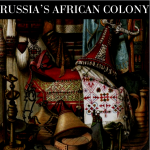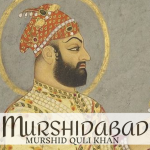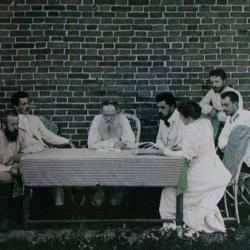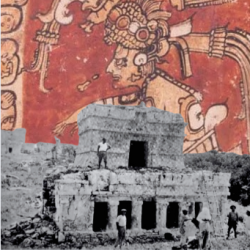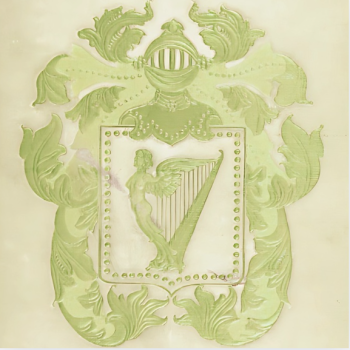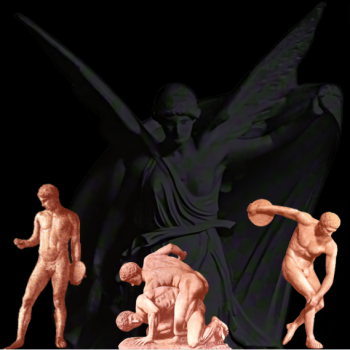BERHAMPORE
Charles Johnston
Late December 1888-Early January 1889.
It was at the junction of the Nalhati State railway, amid the illimitable rice fields of Lower Bengal, where I was waiting, far on in the night, for a train that was to take me to my first post. The engine driver had some doubt as to his skill, so he spent an hour or two practicing, running his little train back and forward a hundred yards or so, and whistling shrilly till the jackals barked back at him. I was in the only first-class compartment, some six feet square, and as I dozed uneasily, I was conscious of high-pitched voices in the next compartment, talking the Bengali tongue, which I had studied industriously at home for the last two years. Finally, with magnificent rhetoric, one of the speakers cried “Amra fighting- for-the-common-cause hoilam!” And all the others applauded vehemently. They were on their way home from the Indian National Congress.[1] We started after midnight, and I fell asleep.[2] The glistening sun of the early morning showed the vast rice-fields all about us, scrubby with brown stubble, as the winter rice had just been cut. Here and there and everywhere were villages, brown thatched huts clustering under groups of cocoa-nut palms and mangoes; and, though it was still chilly morning, hundreds and thousands of natives were at work everywhere in the fields, toiling, as they toil perpetually, on the verge of starvation. As I had come by way of Bombay, crossed the Deccan to Madras, and come up the Bay of Bengal, I had gained some idea of the vastness of India-nearly two million square miles, and its still vaster population, of three hundred millions. Here, in Bengal, they were packed terribly close, for you can travel for hundreds of miles through districts with more than a thousand to the square mile, and almost wholly an agricultural population. There is the true cause of the perpetual presence of hunger, and child-marriages are universal throughout the greater part of India.[3]

Bengal Train Station (Source: Old Indian Photos)
Vivid in my memory is the fish-nosed boat which ferried me across Bhagirathi River—Most vividly do I remember the crook-backed fiddle of a gray-haired musician, who perched on the bamboo platform of the boat, throwing parched peas down his throat with a quick little jerk of the wrist, and an unfailing aim that I watched with incredulous admiration. The boat, the musician in his white drapery, the crook-backed fiddle, had the air of ancient Babylon. One stepped into a picture of ten thousand years ago.[4] Across the Bhagirathi I found a native driver with a ramshackle carriage, and two ponies of skin and bone tied to it with ropes. The sun had already gained strength, and one felt the sting in the sunlight so peculiar to India. The only word of my painfully learned Bengali he readily understood was the English word “Collector.” The cantonment of Berhampore lies four-square, outside parallel with the river Bhagirathi. That side was reserved for the headquarters of the commanding officer and his staff, and the “big house” still rises a story higher than the other buildings. It was the only house in the square that rejoiced in an upper story. It was, I think, the general’s quarters in the old days before the Mutiny of 1857, when Berhampore was a military cantonment, with the square for a parade-ground. The generals of those days had made a garden, adorned with flowering shrubs and foliage-plants, where roses panted through the hot season and took heart again after the rains.[5] The “big house,” with its fine pillared and marble paved drawing room, and wide, cool verandas, looks out over the cantonment square, of close-shorn grass, level as a billiard table, and fringed with splendid flowering trees; here, great golden cups, ranged upright along the branches; there, yellow bells, pendent among the leaves; or, again, tassels of soft crimson, blown hither and thither in the wind.
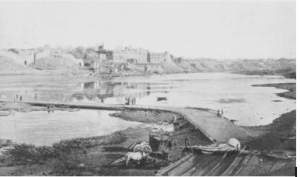
Berhampore Fort.[6]
On either side of the square are officers’ lines; houses all right angles, or rather two long blocks on each side, each a single story high, with wide veranda windows running from the floor to the ceiling and hung with mats of split bamboo, to keep out the glaring heat of the sun. The flat roofs and square cornices give the houses a look of Mocha or Jeddah, or one of those white cities on the Arabian coast. Facing the commanding officer’s quarters, across the square, are the three huge barracks of the European regiments, which were once quartered there; now empty of red coats, and turned over to the uses of civil government.[7] After three hours of hot and dusty driving along red roads fringed with palm-fronds, he brought me safe to the kuti—which is to say house—of the Collector, Godfrey John Bective Tuite-Dalton, on one side of the great grass square of the Civil Station.[8]
~
JANUARY 1889
Vera Johnston
January 6-27 1889.
Three letters from Verochka to her family show us what happened during the intervening weeks between the end of the Convention and their time in Murshidabad. On January 5, 1889, Johnston wired Verochka notifying her of his post. It was Verochka’s birthday the previous day, and although they were apart, Johnston bought presents for her which he gave to her when they re-united.)[9] On January 7, 1889, Verochka left Adyar for Calcutta, where Johnston met her at the station. Verochka states that Johnston’s boss, being a kind Irishman, gave Johnston permission to meet his wife. (The Collector of Murshidabad, Godfrey John Bective Tuite-Dalton, was from Cavan, Ireland, and, like Johnston, a graduate of Trinity College, Dublin.[10] He was the nephew of Colonel Edward Tuite-Dalton, author of the 1872 book, Descriptive Ethnology of Bengal.)[11] Olcott, Noguchi, and Dharmapala, meanwhile, departed for Japan on January 10, 1889.[12]

Calcutta Docks, 1890 (Source: Loc.Gov)
Around the January 19, Verochka took a steamer from Calcutta to Murshidabad, and while on board, a conversation about Blavatsky was held over dinner, and the allegations of her “espionage” were discussed. A young American writer named Augusta de Grasse Stevens had renewed the popular rumor that Blavatsky was a Russian spy by using it as a plot device in her book, Miss Hildreth (1888.)[13] This excited no small indignation in the Russian colony of London.[14] While Novikova laughed it off, Blavatsky threatened to go to her lawyer, and wrote a long letter of protest which W.T. Stead published in the January 3, 1889 issue of The Pall Mall Gazette, under the title “Are All Russian Ladies Russian Agents?”[15] The following are the three letters which Verochka wrote to her family between January 6 and January 27, 1889.
(January 6) I cannot write to you much, because, in all likelihood, I will leave tomorrow. Charley telegraphed yesterday that he was appointed to Murshidabad, a village a little north of Calcutta.[16]
(January 15) Again I cannot write plainly. I am in the hotel in Calcutta for the third time day. I have many things to tell, but I have no time to write. I leave today for Berhampore, where Charley is stationed. He was already there, but since his boss turned out to be a kind man, and moreover, an Irishman, he was permitted to returned to Calcutta an hour before my arrival to meet me. After all the “Caves and Jungles of Hindustan,” am very happy to be in such a comfortable city as Calcutta (where there is ham, and cabbies, and everything is proper,) before we are stuck in the province.[17]
(January 27) I saw many people while staying in Adyar, but not a single European, except ourselves. I must have grown accustomed to this, but when I arrived at the bank for the money that Charley sent me from Calcutta, and again on the steamer, it gave me an almost childish joy to see white people with cropped hair, and beards a la François premier, and wearing pants and hats, not barefoot. I rode in first class because the journey was almost six days. The steamer was not big, and cost 80 rupees. On the first evening, I went out to dine in the common cabin and found myself alone in the company of twelve men, passengers, and sailors. The dinner was very good, everyone was very attentive to me, I answered several questions addressed to me without doubt or hesitation—everything, in a word, was good. Suddenly one the sailors asked:—
“By the way, does any of you know if Olcott has returned from Europe?”
I replied that I came with him on the same steamer, without going into details.
“And this lady, his inspirer, I forgot her name…”
“Madame Blavatsky,” someone suggested. “She was Russian.”
“She’s still in Europe. The local climate is bad for her,” with a sneer in her voice.
“Eh, fullness, they just did not want to tolerate her in India, it was too striking that she has sympathy among the natives.”
“Do you think she was a spy?” asked a very elegant old man who was he looked at me with that gentle, encouraging look that old, good-natured Englishmen know how to look. The answer was almost yes. The old man rebelled.
“She is a very smart woman, but the Russian government would find the best if it wanted, spy. I personally do not know her, but I have heard enough about her to say that she is talkative and does not know how to keep her tongue, she could not hold her tongue.”
This immediately disposed me to him, and all the way I only talked to him from time to time.[18]
On January 27, 1889, not long after Verochka arrived in Berhampore, the Maharajah of Mysore visited Adyar. Richard Harte, Ragunatha Row, Srinavasa Row, Pandit N. Bhashyacharya, and Subramanier Iyer, and Balwantrao formed a reception committee for the unexpected visit. Ragunath Row read an address of welcome, eulogizing the Maharaja for his good Government. A number of Brahmin youths then offered their blessings, chanting Vedic Hymns and presenting two coconuts, “which His Highness accepted with a bow.” Balwantrao and his students, on behalf of the Jubilee Gayan Samaj, then performed vocal and instrumental music. Ragunatha Row and Richard Harte then led the Maharaja to the Library where Pandit Bhāshyāchārya explained the “constitution of the institution, and the nature of the numerous collection of sacred books from all parts of India.”[19]
← Table Of Contents →
SOURCES
[1] In “A Perspective On India,” Johnston writes: “In the next compartment were Bengali lawyers on their way to the National Congress. Through the open window came a penetrating voice: “Amra fighting for the common cause hoilam!” The first word meaning “we,” the last, “are.” There were no words in their native tongue for the thoughts they were dealing with, and they had to borrow from Macaulay; so far from being indigenous was the whole movement of which they were a part.” [Johnston, Charles. “A Perspective On India.” The Atlantic Monthly. Vol. CXXXVIII, No. 6. (December 1926): 848-856.]
[2] Johnston would have arrived at the Nalhati Junction on the 10:10 p.m. East India Railway train. From there he would have taken the State Railway carriage to Murshidabad. Since the connecting train did not leave until 6 a.m. he would have had to have received permission to sleep in his first-class compartment. [Eastwick, Edward B. Handbook of The Bengal Presidency. John Murray. London, England. (1882): 170.]
[3] In “A Perspective On India,” Johnston writes:
“In large areas of the Ganges and Indus valleys the rural population was dense, more than a thousand to the square mile, facing starvation on exhausted, badly tilled soil. The villages were attractive; they seemed to have grown from the earth, remaining akin to it; oblong huts built of mud and thatched with dun reeds made no discordant note among the groves of mangoes and feathery bamboos in the vast expanse of the level rice fields. There were a few brick houses belonging to the [Bhadra-lok] ‘better folk,’ as they called themselves, but their old rose walls struck no inharmonious tone.” [Johnston, Charles. “A Perspective On India.” The Atlantic Monthly. Vol. CXXXVIII, No. 6. (December 1926): 848-856.]
[4] Johnston, Charles. “Helping To Govern India: Kandi Subdivision.” The Atlantic Monthly. Vol. CIX, No. 2. (February 1912): 265-273.
[5] Johnston, Charles. “A Holy Man: Helping To Govern India.” The Atlantic Monthly. Vol. CX, No. 5. (November 1912): 653-659.
[6] Foster, William. Early Travels In India (1583-1619). Oxford University Press Oxford, England. (1921): 138-139.
[7] Johnston, Charles. “Prophecy Fulfilled.” The Providence Journal. (Providence, Rhode Island) October 3, 1897; [Kuti] Johnston, Charles. “Helping To Govern India.” The Atlantic Monthly Vol. 108, No. 5. (November 1911): 643-652.
[8] The Collector of Murshidabad when Johnston first arrived was Godfrey John Bective Tuite-Dalton, from Cavan, Ireland and fellow graduate of Trinity College, Dublin. [The Dublin University Calendar For The Year 1889. The Dublin University Press. Dublin, Ireland. (1889): [Civil Service of India: 5.]; Ancestry.com. India, Select Marriages, 1792-1948 [database on-line]. Provo, UT, USA: Ancestry.com Operations, Inc., 2014.]
[9] Johnston, V. V. “Letters of Vera Johnston,” January 27, 1889, Adyar, India, entry.
[10] The Dublin University Calendar For The Year 1889. The Dublin University Press. Dublin, Ireland. (1889): [Civil Service of India: 5.]; Ancestry.com. India, Select Marriages, 1792-1948 [database on-line]. Provo, UT, USA: Ancestry.com Operations, Inc., 2014.
[11] Tuite-Dalton, Edward. Descriptive Ethnology of Bengal. Office Of The Superintendent Of Government Printing. Calcutta, India. (1872); Haldar, Sukumar. A Mid-Victorian Hindu: A Sketch of the Life and Times of Rakhal Das Haldar. S. Haldar. Ranchi, India. (1921): 165.
[12] Olcott, Henry Steel. Old Diary Leaves: Volume IV. Theosophical Publishing Society. London, England. (1910): 89.
[13] “And even you, sir, must remember the great noise regarding Madame Blavatsky, who, as the priestess of theosophy, for many years carried on a secret correspondence with Monsieur Zinovieff, then Chief of the Asiatic Department of the Foreign Office, and with Prince Doudaroff Korsakoff, Governor-General of the Caucasus? But for Lord Dufferin’s clear- sightedness, Madame might still be carrying on her patriotic work.” [Stevens, Augusta De Grasse. Miss Hildreth: A Novel. Ward And Downey. London, England. (1888): 141-142.]
[14] “Tittle Tattle For The Table.” The Pall Mall Gazette. (London, England) December 31, 1888.
[15] “There are only three or four lines which refer to me. The dozen other persons who are lied about in this work of unique fiction are invited to take care of themselves. As for me, it is enough for me to answer the four distinct falsehoods and the libel for which the author is responsible on my account alone. These falsehoods are based on no foundation whatever, save perhaps on public gossip and the efforts of those good souls who think that the best way of ‘entertaining people’ is to serve them with slices of freshly murdered reputations. This particular calumny is an ancient three-years-old slander, picked up from the gutters of Anglo-Indian hill stations, and revived to serve a special purpose by one who, unknown to the world the day before, has since made himself famous in the annals of the world’s iniquitous verdicts by playing at the detective on false scents. But if the originator of this vile invention is not the authoress of Miss Hildreth, she is still the first one who has had the impudence of recording it in a novel, adding to it, moreover, a flavor of her own venom. It is, therefore, to her that I address the following refutations. [1] I have never corresponded, whether secretly or openly, with a ‘Monsieur Zinovief;’ nor with the general of this name, nor have I ever been accused before to my knowledge of having done so. [2] I have never written in all my life on politics, of which I know nothing. I take no interest in political intrigues, regarding them as the greatest nuisance and a bore, the falsest of all systems in the code of ethics. I feel the sincerest pity for those diplomats who, being honorable men, are nevertheless obliged to deceive all their lives, and to embody a living, walking, lie. [3] Ten years ago, the Anglo-Indian Government, acting upon a false and malicious insinuation, mistook me for a spy; but after the police had shadowed me for over eight months—without unearthing a trace of the charge brought against me—it found to its great sorrow that it had made an April-foul of itself. Yet the Anglo-Indian Government acted, after that, in the most honorable way. In November 1879, Lord Lytton issued an order to the Political Department that Colonel Olcott and myself should be no longer subjected to the insulting surveillance of the Anglo-Indian police. From that day we were no longer annoyed. [4] Prince Doudaroff Korsakoff stands probably as the cunning anagram of Prince Dondoukof Korsakof? This gentleman has been a friend of my family and myself since 1846; yet beyond two or three letters exchanged, I have never corresponded with him. It was Mr. Primrose, Lord Lytton’s secretary, who was the first to write to him, in order to sift to the bottom another mystery. The Anglo-Indian Mrs. Grundy has mistaken me for my ‘twin brother’ apparently, and people wanted to know which of us was drowned ‘in the washtub during our infancy—myself or that ‘twin-brother,’ as in the fancy of the immortal Mark Twain. Hence the correspondence for purposes of identification. [5] Lord Dufferin’s ‘clear-sightedness’ is no doubt a fact of history. But why endow his lordship with soothsaying? Doomed by my physicians to certain death unless I left India (I have their medical certificate,) I was leaving Madras for Europe almost on the day of Lord Dufferin’s arrival at Calcutta. But then perhaps Lord Dufferin stands in the novel only cabalistically for Lord Ripon? In such case, as all the three Viceroys—from 1879 to 1888—are now in Europe, it is easy to learn the truth, especially from the noble Marquis of Ripon who remained Viceroy almost during the whole period of my stay in India. Let the press inquire, from themselves or their secretaries, whether it has been ever proven by any of their respective Governments that I was a political agent, whatever may be the malicious society gossip of my enemies. Nor do I feel so certain yet, unless this disgraceful rumor is sufficiently refuted, that I will not appeal directly to the justice and honor of these three noblemen. Noblesse oblige. The least of beggars has a right to seek redress from law, and to appeal to the evidence of the highest in the land, if that evidence can save his honor and reputation, especially in a case like this, when truth can be made known with one simple word from thebe high witnesses—a yea or a nay. I say it again, Miss de Grasse Stevens and her publishers stand accused of an uncalled-for libel. I may or may not be endowed by nature with the potentiality or even the commission of every mortal sin. But it so happens that I have never meddled in politics, am innocent of any knowledge of political intrigues, never bothered myself with this special science at any time of my long life, and that ‘where there is nothing, the King himself loses all rights.’ The ‘spy’ charge was thus at all times a mare’s nest. In closing I would offer a hit of advice to my last slanderer. Since the authoress of Miss Hildreth seems chronically afflicted with the political microbe, let her try her hand at something she knows more about than subterranean Russia and its agents. Her book is not only libelous, it is absurd and ridiculous. To make Count Mellikoff talk in a drawing-room of our ‘little Father’ [read the Tzar !!!] is as correct as it would be to address Miss Stevens au sirieux as ‘the great Mother-Squaw’ in London. Let her turn to the realistic beauties of her native lobbyism for which she seems admirably fitted; otherwise she will soon come to grief.” [“Are All Russian Ladies Russian Agents? What Mme. Blavatsky Has To Say.” The Pall Mall Gazette. (London, England) January 3, 1889.]
[16] Johnston, V. V. “Letters of Vera Johnston,” January 6, 1889, Adyar, India, entry.
[17] Johnston, V. V. “Letters of Vera Johnston,” January 15, 1889, Adyar, India, entry.
[18] Johnston, V. V. “Letters of Vera Johnston,” January 27, 1889, Adyar, India, entry.
[19] “The Maharaja Of Mysore At The Theosophical Society.” Madras Weekly Mail. (London, England) January 30, 1889.


